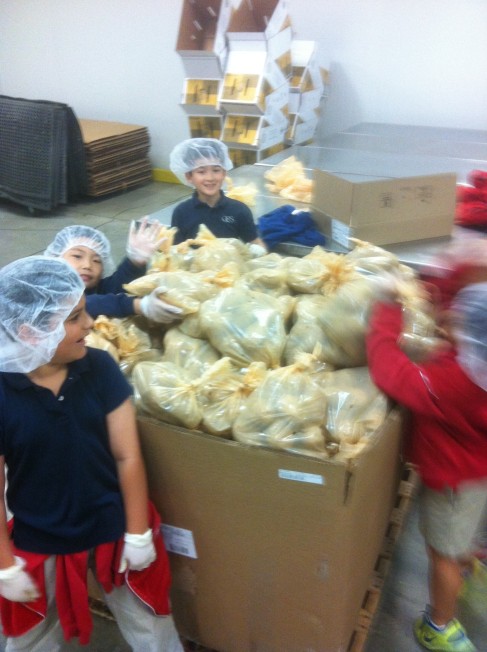If you want to find out what goes on during a typical school day for my two second grade boys, it usually takes a little digging.
When I arrived home this afternoon, my 8-year-old twins met me in the driveway, rapped on the car window, and triumphantly declared: “Guess what we did at the Oregon Food Bank? We put 10,555 pounds of potatoes in bags that made 1,760 meals to give to people!”
No follow up question was required.
In rapid fire succession, the twins painted a picture of a mountain of potatoes being systematically transformed into 6-lb bags which could ultimately feed 8,796 people.
“I personally fed 150 people,” my younger twin announced.
Not to be outmatched, his brother countered that he was closely connected to the discovery of “a stinky potato” which was lobbed into a compost heap.
Numbers and measurements were important part to the story. I learned that the potatoes first appeared in giant plastic totes which were “as long as a second grader and as tall as a first grader.”
Equally significant were the specific jobs and tasks that were mastered and performed. I learned there were “bag fillers,” “knot-makers” and “runners” who carried their precious cargo to a large box for distribution.
On a previous field trip to The Oregon Food Bank, I experienced this excitement first hand when I watched second graders prepping thousands of bags of frozen yellow corn and cut green beans. I was amazed by the zeal and sense of responsibility these 8-year-olds displayed about their work and the audible cheers which arose when they learned how much they had accomplished in a few short hours.
What impressed many parent volunteers at the food bank was the children’s can-do spirit. In the two hours I stood alongside these little workers, I did not witness the eye rolling or grumbling that so often accompanies chores at home. I will concede that raking giant volumes of cascading corn into a plastic bins or running with potatoes is definitely more fun that cleaning your room. Especially, one student told me, when you get to wear gloves, an apron and a hair protector that looks like a shower cap.
There was a lot to be learned, questioned and discovered about this experience. In our house, we rolled around questions about hunger, math, and machinery and marveled at the wonder of a heart-shaped potato. There was also the sense of being part of something bigger. Tualatin Valley Potato donates two million potatoes each year to the Oregon Food Bank for distribution. As teacher Tonya Griffin aptly noted, “This activity helps these kids be connected to the process and the community.”
Perhaps it is the collective accomplishment that made this experience truly memorable. The mastery of “I fed 150 people” is great. But the power of, “In two hours, we bagged enough potatoes to feed 8,796 people!”, that is undeniable.

